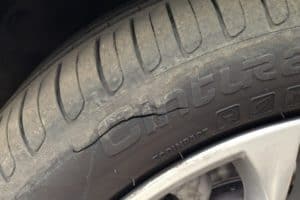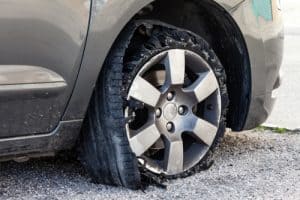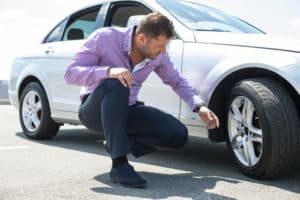Let’s face it, the world is full of potholes. From tiny craters to huge caverns, no road is immune. Unpredictable road conditions are a fact of life for all drivers. Unfortunately, this makes keeping your car in peak condition incredibly difficult. Even if you manage to keep an eye on your tyres, the road will often have other ideas as they inevitably wear down with time and usage. Luckily, there are plenty of ways to tell when your tyres are on their last legs and prevent them from becoming a safety issue. Whether you’re about to embark on a long drive or simply want to avoid the hassle of getting new tyres again at some point in the future, here’s everything you need to know about cracked tyre laws, the various signs that indicate when your tyres need fixing, and what you can do about it.
Are Cracked Tyres Illegal?
While you might have heard that cracked tyres are illegal, this isn’t actually true. Instead, cracked tyres are actually illegal if they don’t have the right markings. This applies to brand-new tyres, so if you manage to get hold of a set that’s got a few issues, it’s not the end of the world. If, however, your tyres have significant wear or the cracks are too large, they can become unsafe very quickly, leaving not only the driver but other road users in danger.
Cracked Tyres are illegal if they don’t have the correct markings. If you’re looking at a set of tyres, and you notice something wrong with them, don’t worry, it’s probably just a manufacturing error. However, if you find that your tyres are cracked, it may be time for a replacement. Cracks in your tyres can easily lead to a blowout.
What are the signs that indicate your tyres need fixing?
There are multiple signs you can identify which will tell you that your tyres are ready to be replaced. Acceleration is the first one. If you feel like your car accelerates slower than normal, this could be because your tyres don’t have a good enough grip.
If there is a nail or something similar lodged in there, this is another obvious sign that your tyre needs replacing, as this will lead to a puncture.
Tyres are one of the main factors that come into play when calculating fuel efficiency. While you can’t expect a brand-new set to increase your fuel efficiency right away, you do need to make sure the ones you have are in top condition to avoid wasting petrol.
The car is making unusual noises: While all cars make noise, you should be able to identify the source of any strange sounds coming from your vehicle. If your tyres are making a lot of noise and it doesn’t seem to be coming from the road, they may have been damaged by debris, and it’s time to replace them.
How to tell if your tyres are beyond repair?
They are very worn: Like most things, tyres are supposed to be replaced when they’ve been worn down to a certain point. If you’ve had your current ones on the car for quite a while, you may want to get them checked out by a professional car garage to see if they’re still usable.
There are large cracks in the rubber: This can be a little misleading, but it’s a good indicator that your tyres will fail soon if something isn’t done. In order to keep your car safe and avoid fines, you need to replace the tyres when they get to this state.
What’s the easiest way to fix a tyre?
Replace it: If you find that the damage is too extensive to fix, it’s definitely time to replace the tyre. While you can get away with fixing a small puncture at home, you need professional tools to repair a large crack. It’s best to replace the tyre before it causes problems that could lead to accidents or fines.
Patch the hole: If you have a small puncture in one of your tyres, you may be able to patch it up yourself. If you’re unsure how to do so or if it’s worth it, then discuss it with your nearest garage. Additionally, you should make sure to keep the repaired tire off the road until the patch has been tested.
3 Ways you can get new tyres without breaking the bank
- Get a tyre voucher: Many car manufacturers offer vouchers for new tyres. If you have a new car, you may be eligible for a free set of tyres. For older cars, you may be able to get a discount on new tyres. It’s a good idea to check with your car dealer every few months.
- Get a low-cost tyre repair: If one of your tyres has a small or shallow puncture, you may be able to get it repaired at a low cost. Depending on where you live, you may be able to do this yourself or find a garage that offers low-cost repairs.
- Take advantage of sales: If you need to replace tyres at any point, check to see if there are any sales going on. You may be able to get a set for a lower price than normal, especially if you buy a certain quantity.
Tyres are an important part of your car, but they often go overlooked. If your tyres are in good condition, they will help you drive safely. However, they won’t do you any good if they are damaged in any way. Once your tyres are beyond repair, it’s time to get new ones. Fortunately, you have a few options available when it comes to purchasing new tyres, and don’t forget, if you need help with making a decision or are in need of further advice, just get in touch with our garage, so our professional team can help you.
What causes tyres to crack?
Many factors can contribute to your tyres cracking, and the last thing vehicle drivers want is to be broken down on the side of the road. As well as the inconvenience, damaged tires can lead to accidents and put your life in danger. Have a look at a couple of factors that can contribute to your tyres splitting and a couple of top tips on how to avoid buying new tyres and, instead, fixing your tyres on a budget.
The top reasons for getting a cracked tyre includes:
- Age
- Water
- Natural Degradation
- UV Rays & Heat
- Tyre pressure
How Long Should Tyres Last Before Cracking due to Age?
As a rule of thumb, front tyres generally last for at least 20,000 miles before they can show any signs of ware and tear, and back tyres can last double the amount. This is all subjective to other factors too like how the car is driven or if the car is left unused for a long period of time.
FAQs:
Will Cracked Tyres Fail MOT?
The legal tread depth of your tyres should be 1.6mm. If the depth is below this, or your tyres are torn, extremely cracked or bulged, they will be deemed as unsafe and therefore will fail the MOT of your car.
Are Cracked Tyres Legal?
If your car tyre has only small cracks in it, they are still legal, however is a sign that your tyres are on their way out. If the cracks however are substantial, then they will be classed as illegal, putting other road users and yourself in danger when you are driving.
Why Do Cracks Appear On Tyres?
Age is the main cause for the degradation of car tyres that leads to cracked tyres. As a tyre gets older, the polymers will weaken, therefore they start to break down. This causes a loss of elasticity, leaving the tyre brittle, and eventually leading to a cracked tyre as it fully weakens.
There are factors you cannot control, such as sunlight or exposure to UV rays. Which can weaken the rubber compounds in your tyres, resulting in cracking.
The conditions the tyres are performing in are also a factor. Frequent driving along uneven terrains, driving habits such as hard braking or exposure to chemicals like oil, petrol, diesel or even cleaning solutions can result in degradation of your tyres compounds.
However, there are things that car owners can control that affect the life of their tyres. These include:
Under-inflation of your tyres – this causes an excessive bending of the tyre walls, leading to a heat build up when driving, resulting in a weakened tyre. On the other hand, putting extra stress on your tyres by overloading can be the culprit of tyre cracks.
When are Cracked Tyres Dangerous?
Tyres are at their most dangerous when they are cracked, the thinner the tread is, It is vital to address them properly as soon as you realise. Cracked tyres are particularly dangerous when. There are factors you should consider when looking at your tyre cracks,
- Location of the crack in the tyre: Cracks near the centre of the tread are not as serious as those located on the wall. Cracks on the wall of your tyres can result in sudden tyre failure and loss of control of a vehicle.
- Size of the tyre crack: Review the depth and length of the crack
- Driving conditions: Cracked tyres have reduced performance, traction and handling are affected. This ch may be detrimental if you are driving in wet or icy conditions.
- Long distance driving: Cracked tyres can become worse when they are put under continuous stress, the heat build up during a long drive may worsen the cracks or lead to a blow out.
We provide a free tyre check to assess your tyres condition and offer our advice if you require a new set of tyres. We have 3 garages in Newport, Cwmbran and Pontypool so visit your local branch today.




